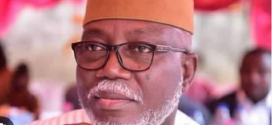In recent times, the National Assembly has not been perceived to be people-friendly at all. This is not unconnected with so many factors, ranging from the remuneration packages of the members to the cursory oversight being usually carried out on the executive and its activities. The peak of it was considered to be in the take-a-bow-and-go style of screening of the ministers, which was held sequel to their appointments. This is, however, not the concern of this piece.
This piece arose out of recent steps taken by the National Assembly, particularly the Speaker of the House of Representatives, Rt. Hon. Femi Gbajabiamila, the first of which was the trigger of the reform of the social investment programme of the Federal Government. The second relates to the swift response of the Honorable Speaker to the maltreatment of our nationals in China. The third and which is the fulcrum of this writeup is the adoption, modification and prosecution of our earlier suggestion in this column that Nigerians be supplied free electricity for a period of at least a month. Apart from the goal of interrogating further the response or, as usual, the defense of the bureaucracy on the issue, the essence is to appreciate some of these steps of the Speaker.
A Yoruba proverb says, “yin’ni, yin’ni, ki a le se mi si,” which literally translates to, “little appreciation spurs one to do more.” The holy books also exhort us to be appreciative of favours received, although, in this instance, performance. It is ultimately a universal virtue to, therefore, be appreciative of good gestures. This is even more pertinent in our clime where performance and delivery remain scarce commodities in the public space. Thus, where it is observed that public officials suddenly wake up to their responsibility or as a display of their individual characteristic, we need to quickly encourage them as that might be the much-needed stimulus that would lead to reform in the orientation of public officials. It is in this regard that I salute his various interventions in recent times and urge that more of it be carried out, particularly when the people’s interest is affected.
Inasmuch as I will not advocate chaos in the operation of separation of powers, other arms of government, particularly the National Assembly, need to realise that once there is exit of election, governance and welfare of the people become their primary responsibilities beyond party affiliation. It is along this trajectory that I intend to evaluate the question of free electricity for households in the country during this challenging period when stay-at-home order in various shapes adorns our landscape. In virtually all the states, citizens, aside from those on essential duties, have been asked to stay at home in order to stem the tide of the spread of COVID-19. There is no doubt that this is imperative. However, beyond the survival of the vulnerable and the poor that occupy the centre stage, availability of social utilities like electricity takes the next stage. This includes price of consumption. While the National Electricity Regulatory Commission (NERC) has been on the neck of the electricity distribution companies (Discos) on the availability of electricity, the issue of pricing is yet to be decisively addressed. The fact is that an average Nigerian who is forced to stay at home will incur not less than three times normal bill, once there is average supply. Remember, he must be at home at all times now, contrary to the period of normalcy when substantial number of hours was spent outside the home in pursuit of livelihood and other needs. Beyond this comfort issue, electricity is central to all other activities around us.
Virtually all the devices that we require to survive while indoors require electricity to function. All online transactions, including banking and payments for goods and services, demand electricity. Activation of telecommunication requires electricity, as simple as charging our phones and computers might look like. Just like the governors are having virtual meetings with their colleagues and the Presidency, private citizens are now engaging one another in order to proceed with relevant economic activities and keep office functions going. Water is another essential of life that, substantially without electricity, its availability becomes impaired. The further implication of lack of water is poor sanitation, which is capable of leading to another epidemic as well as spreading COVID-19, as there won’t be sufficient water to wash hands as prescribed. In fact, sanitation practice is on the front burner of solving COVID-19.
Additionally, unaffordable electricity will equally endanger the citizens who will be unable to put on their security lights. Evil and criminality thrive more under the cloak of darkness and once there is electricity outage, most communities are plunged to complete darkness. Those who thrive in criminal activities pride themselves in the Yoruba aphorism calling themselves omo oru laa se’ka (evils are perpetrated in darkness). Recently, demand for virtual court sittings has been on the increase. How affordablecould this be to the operators such as judges and lawyers alike? Again, e-learning is being promoted all over, where there is even power supply, who bears the unbudgeted bills? Even where budgeted, a sizeable portion of daily earners and the self-employed have no earnings presently. In view of all the above, the pre-eminence of electricity supply can be gleaned and appreciated.
Now to the core of our discussion, while the Speaker of the House of Representatives has escalated the request for free household electricity to the Presidency, he has of recent taken further steps to interrogate the issue with all the stakeholders. This is a step again worthy of commendation. Regrettably, however, coming out of the meeting, one could observe the palpable reluctance and seeming resistance from the bureaucrats to the suggestion of free electricity supply to the people in the lockdown period. The premise of their objection essentially is, who picks up the bill? To my mind, this is quite amazing as who else should pick the bill other than government? Section 14 of the Constitution imposes the duty of our welfare on the government. From the figures touted by the operators, it will cost about N109 billion to offset the bill for two months. Without engaging in any statistical analysis, it is easily deducible that, if the people are not made to stay at home and the lockdown is not imposed, it cannot cost the government anything less than five times of the said amount to combat the scourge, were it to have a free rein, which the absence of the stay-at-home order would have guaranteed. This alone, from a comparative point of view, is sufficient to convince anyone that paying the said sum for electricity consumption of the people during the lockdown period is a step in the right direction. This is apart from the cost of international stigma the nation would bear, if proactive steps had not been taken. By now, we would have added the unenviable cap of being the world capital for COVID-19 pandemic to the poverty capital cap we proudly bear. The multiplier effects of deaths on our streets, decline in human productivity and ultimate economic downturn cannot be quantified. The amount of foreign investments that would be lost, coupled with the ones on ground that would roll back their investment efforts, cannot be appreciated in mere anticipation. The fund for settling the electricity bill of the people can come from the N500 billion planned for combating COVID-19. The expense would be justified as forming part of the efforts in combating the dreaded disease and can be easily accounted for, unlike the claim that billions have been disbursed as palliatives to Nigerians, which most of the people doubt is possible. It can even form part of the contribution of NLNG by way of donation or conversion of our dividends for the provision of gas. The COVID-19 fund is in excess of N25 billion, excluding the N21 billion from the EU. This is leaving aside the fund raised at the instance of NNPC meant for brick and mortar.
I also observe excess unappropriated fund in the hands of agencies and parastatals that are being donated at the whim and caprices of the custodians. We can vacuum all these to offset the bill. Beyond all these, the CBN rolls out trillions and billions as stimulus in one form or the other, this can be part of the package. In the worst-case scenario, a month electricity bill is too inconsequential for the government to bear.
Mr. Speaker, I have gone this far to demonstrate the importance of ensuring free electricity supply to the people in the fight against COVID-19 as well as exploring possible modes of funding. This is essentially to urge you on in the delivery of this palliative. As expected with civil servants, you can certainly not have it easy anyway. They will strew all manners of excuses on your way, but, please, don’t give up. It is the tradition in Nigeria for some people to oppose any suggestion made in the interest of the people for any motive or none at all. At the end of the day, the money gathered to fight COVID-19, if not spent on palpable things that can benefit the people, will end up un-accounted for. It is for these reasons adduced that the campaign for ultimate interest of the masses should be sustained, come what may. If you are able to achieve this, Honorable Mr. Speaker, your name will become indelible in the consciousness of the people who would have benefited in this time of actual and dire need and you will become omo odo ere ( a worthy ambassador).
Don't miss:
- HOW AIYEDATIWA UPS THE ADMINISTRATION OF JUSTICE IN ONDO STATE. By Sunday Olugbenga Abire
- JK Randle musuem in the hands of a caveman. -Duke of Shomolu
- IGP Orders Crackdown on Attackers of Borno Police Station, Condemns Killing of Officers
- The Power of Manipulative Social Media: Unpacking the Lagos Tourism Commissioner’s Viral Video Incident
- Remembering ‘Cash Madam’: The Iconic Legacy of Princess Khadijat Adebisi Abike Edionseri
 Hottestgistnaija.com
Hottestgistnaija.com



